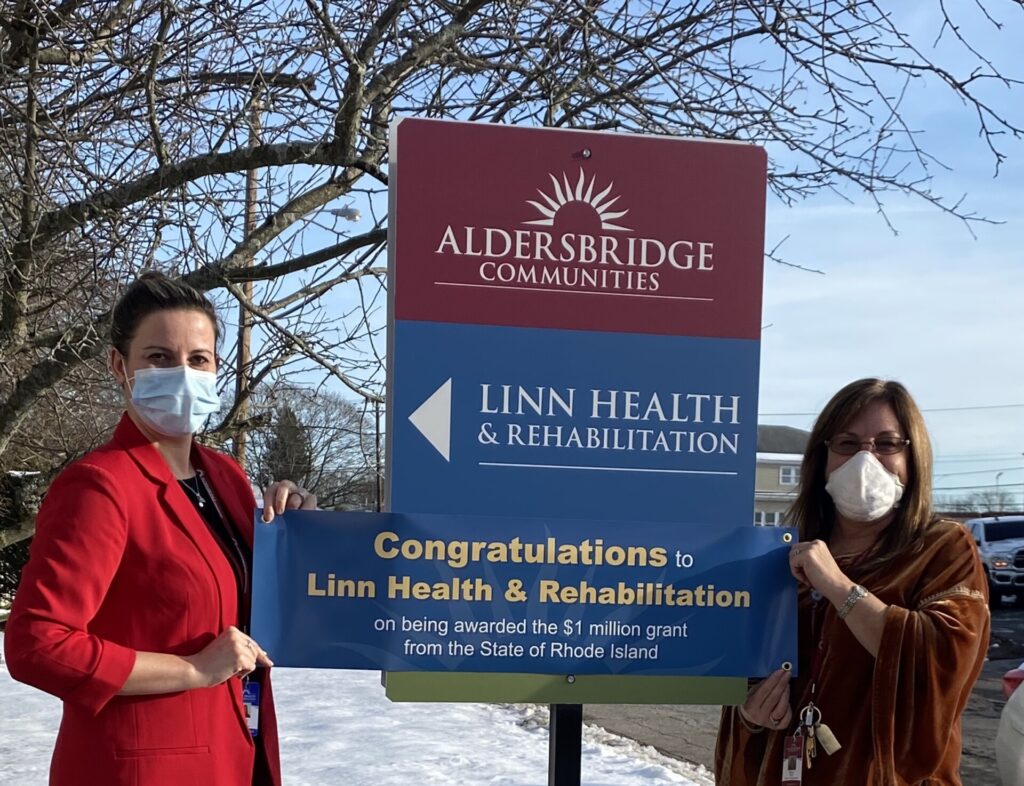 LINN HEALTH & REHABILITATION RECEIVES $1 MILLION GRANT TO TRANSFORM ITS BUSINESS MODEL CARES Act state funding to be used to create 11 private rooms to help control spread of COVID-19 and other infections; launch new home- and community-based services program
LINN HEALTH & REHABILITATION RECEIVES $1 MILLION GRANT TO TRANSFORM ITS BUSINESS MODEL CARES Act state funding to be used to create 11 private rooms to help control spread of COVID-19 and other infections; launch new home- and community-based services program
Linn Health & Rehabilitation is one of eight nursing facilities in the state to be awarded a $1 million grant from the Executive Office of Health and Human Services.
The grant is part of Governor Raimondo’s Long-Term Services and Supports (LTSS) Resiliency Program created in response to the COVID-19 pandemic. Funded by state aid designated by the federal Coronavirus Aid, Relief and Economic Security (CARES) Act, this initiative supports the transformation of nursing facilities into more resilient environments where risks associated with the coronavirus can be more easily controlled, and to invest in home- and community-based services as alternative care settings to hospitals, nursing homes or assisted living residences.
“This LTSS competitive grant opportunity was offered to support change, resiliency and diversification in nursing home business models. We responded with our innovative plans, and are very grateful to be awarded this grant,” states Richard Gamache, MS, FACHCA, chief executive officer of Aldersbridge Communities, parent organization of Linn Health & Rehabilitation. “Before the COVID-19 pandemic hit, our Board of Trustees and leadership had been visioning what life in a congregate setting should look like. This grant is our stepping stone to the future of elder care at Linn.”
The first part of Linn Health & Rehabilitation’s workplan calls for transforming 11 skilled nursing and long-term care rooms from semi-private to private, each equipped with the latest in ventilation, lighting and technology for infection control, and an ensuite private bathroom with shower. The renovated rooms will be kept separate from other rooms, helping to control the spread of germs and for potential use as an infectious disease isolation unit should the need arise.
“Nursing homes like ours were built in the 1970s and haven’t changed much architecturally over the years,” notes Gamache. “Our most vulnerable population – elders – are the most susceptible to illness and viral spread, yet they often share rooms and washrooms in institutional settings. We are confident our new private rooms will be appreciated by residents, their families, direct care staff and referral sources alike.”
The second part of the workplan to be funded by the grant is to introduce a new initiative called the Linn Health Navigator, aimed at keeping older persons in the community living independently in their own homes. Elders would enroll in this program to be linked with a community network of social services and other needs such as handyman or errand services. It will be staffed by a care manager who can monitor the health status of enrollees, including those discharged back home following successful care and treatment at Linn Health & Rehabilitation. “We recognize that people want to stay in their homes for as long as possible, and they just need the right support. Sometimes it’s as simple as getting groceries or help to shovel snow. But it can also be ensuring their diet is nutritious and not deficient in some way to cause or trigger an acute illness,or making sure the medications they are taking don’t cause an averse reaction to land them in the Emergency Room,” explains Gamache. “The Navigator Program can help reduce Medicare and Medicaid costs by eliminating unnecessary hospitalizations, and can delay or even prevent relocation to a nursing home or other congregate care setting,” explains Gamache. “It can serve as a national model for pre-emptive care.”
The LTSS grant was established by the State of Rhode Island to help eligible nursing homes recoup financial losses realized during the COVID-19 crisis. In addition to reducing their 2020 losses, Linn Health & Rehabilitation has earmarked a portion of the grant funds for the conversion project development and for staffing the Navigator Program care manager position.
“We are excited to begin our initial, transformative steps to realize our mission of empowering those in our care to live with dignity and comfort,” states Gamache, a leading expert on ageism who has overseen many groundbreaking elder care initiatives throughout the region during his 40-year career such as the creation of R.I.’s first sub-acute care program in 1992 and establishing the first two elder-friendly hospital ER departments in New England in 2012. “We look forward to supporting and improving the health outcomes for all Rhode Islanders who use our services.”
